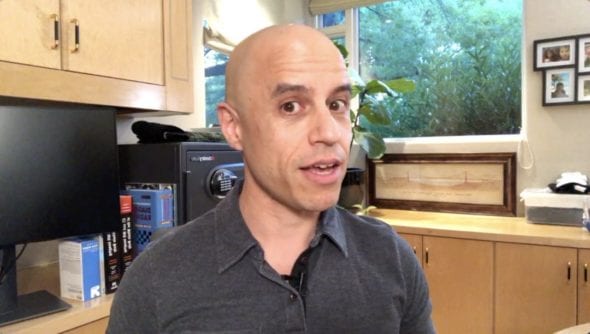Delta variant vs. vaccines, hospitalizations, children, masks and more, explained by a doctor with precisely 97.5% less drama 👍
Man, every time I think I get to stop talking about COVID, they keep pulling me back in. This time it’s the Delta variant. Let’s talk about this. The reason I wanna do a video is my parents asked me about this, they’re both fully vaccinated with the Pfizer vaccine, and they’re watching the news, and they’re freaking out, like a lot of people are.
I’m getting a lot of messages. So what is a Delta variant? It is a new series of mutations that has become in many parts of the world the dominant strain of circulating coronavirus. How does that happen? It’s really quite simple. The virus doesn’t have any intelligence. It’s not making decisions, it’s just as it replicates in humans, it suffers mutations, changes in its RNA, genetic code, and it turns out that some of those mutations make the virus less likely to succeed in the world, and some make it more likely, and it turns out that as the pandemic evolves, the more replication you have, the more chances you have to select for a virus that’s got more fitness.
It’s more able to either reproduce at a higher viral load, so a given individual has more virus, that maybe that virus is more transmissible, it hangs out in air more, maybe it’s more sticky to the ACE2 receptors, so something in that spike protein changes that allows the receptor binding part of it to stick more, and then allows it to actually release easier, so that it enters the cells, all kinds of things can happen. In addition, another sort of adaptation that can be selected for in the virus is that it’s a little resistant to our existing antibodies if we’ve been previously infected, or monoclonal antibodies, which we’ve developed in the lab to fight this thing, because there are changes in the spike protein with the new genetic code, the new instructions, that make it less likely for these old antibodies to bind.
So with Delta variant, which originally arose, was described in India, as opposed to Alpha variant, which was originally described in the UK, each of these variants seems to be more transmissible, easier to catch, than the prior, original, the OG coronavirus, right? So as you see these things arise, they quickly, because of just straight evolution, become the dominant virus in the world. So Delta very rapidly is replacing Alpha, which very rapidly replaced the sort of wild type Wuhan strain of the virus. And there’s a lot of other little variants…
So, what does it mean with Delta? Why is everyone panicking about Delta? First of all, you shouldn’t panic about Delta, period. This is the deal with Delta. It’s likely, based on preliminary data, and by the way, anyone who tells you that they know exactly what’s going on with this thing, and speaks with absolute certainty about any of this, is selling you something, just ignore them, okay? We don’t know a lot about this, but here’s some things that we do know based on the best available data. So Delta probably is more transmissible, probably about twice as transmissible as Alpha, which was about twice as transmissible, and I’m giving you rough numbers here, as the original thing.
So it’s probably easier to catch if you don’t have immunity to coronavirus, either in the form of natural immunity from previous infection, or vaccine-induced immunity. Now, people have talked about, “Well, the natural immunity isn’t as good as the vaccine immunity,” and so on and so forth, look, I haven’t dived into all that data. I’m gonna suspect that the vaccines are very, very robust at producing very specific immunity that’s actually quite robust, and natural immunity may be as good in some cases, maybe it’s less good if you had less of a viral inoculum to begin with, a milder case, et cetera, there’s a lot of variables that go into natural immunity that are easier to control for with vaccine, because vaccine, you have a standard dose given twice, if it’s mRNA vaccines, right?
So this is what they’ve sort of looked at in England, Public Health of England pre-print, the vaccines, let’s say Pfizer and AstraZeneca is what they looked at, right, are pretty much almost as effective against Delta as they were against Alpha and the previous strains. So you’re talking like 88%, 94% against hospitalization, with Delta variant and Pfizer, even a single dose of either of the vaccines, like 75% effective against Delta, just a single dose.
Now it looks like the double, the second dose, actually does increase your immunity, because there’s a priming effect. You give the first dose, immune system gets on blast, you give the second dose, and like the clone army gets really solidified and activated to fight the infection when it comes again, so they are recommending getting the two doses if you can. But even people who’ve been previously infected, they probably have some immunity against Delta.
And by some, what I mean is this, and this is true of the vaccine as well. You might be able to get infected, you might have symptoms, you might even be, you know, down for the count for a couple days, but are you gonna get hospitalized with severe disease, or die? That’s the real operative question, because hey, we’re all used to colds and flus, no big deal.
Are you gonna die or be hospitalized? And the answer is, probably not. In fact, with the vaccine, there’s a, it’s really unlikely. Most of the people who are hospitalized and dying currently are unvaccinated, and this is definitely true in parts of the world where vaccine penetrance is very low: Africa and India, very low vaccine penetrance, and look what’s happening. Look what’s happening in Australia. They have to go on lockdown again because they’re largely unvaccinated, and Delta is gonna rip through there unless they do these very aggressive measures that have a ton of collateral damage.
So the question is, if you’re vaccinated, what, should you fear Delta? The answer is, I’m telling you, probably not, right? What if you’re a kid, you’re 12 and under, you can’t be vaccinated, should you fear Delta? Well, more kids, statistically, are going to get infected, because it’s a transmissible virus, and they’re vulnerable because they’ve not been infected previously, or they can’t be vaccinated yet, so yeah, you’re gonna see more cases in kids.
But it doesn’t look so far like it’s more fatal or more damaging in kids, and this data is still emerging, but even if it was, the rates of severe illness, hospitalization, and death in children are so small, should you be panicking about your kids? And the answer is, probably not. It depends on what your risk tolerance is, right? If, like, crossing the street frightens you for your kids, it should, ’cause that’s more dangerous than dying of coronavirus with your kid. So you ought to think about it this way.
Now, WHO’s come out and said, “Oh, now we should wear masks even for vaccinated people because of Delta.” Okay, this is just an abundance of caution clearly, because we don’t even know the effect that mask has in a vaccinated person on the risk of getting Delta, which is incrementally smaller, right, so what’s the downside of masks, you have to ask that. But either way, if you wanna wear a mask, and feel more safe, go ahead, but here is the bottom line about what to think about Delta. Don’t think about it if you’re vaccinated.
If you’re unvaccinated, think about it this way: what was your risk before all this of dying of COVID based on your age, risk factors, other comorbidities? That’s gonna be your risk with Delta probably, although there is some evidence that Delta is more likely, about doubly likely, to land you in the hospital, although that’s based on small numbers, and we’re gonna have to really see whether that pans out. But let’s say it’s the same risk as the other one, but you’re more likely to catch it because it’s so transmissible.
Well, you’re in the same boat, so you have to make a decision. Should you be vaccinated or not? There are, in my mind, if it were my family, which it is, because I vaccinated all of them that could be vaccinated, including my 13-year-old, which is a more complex calculation, I’ve done a video on that, because there is that small risk of myocarditis, which is small, but it’s not zero, and their risk of getting very sick is quite small, right? So all that being said, I would say get vaccinated, and then you don’t have to think about any of this.
Any adult who can be vaccinated, in my mind, should be, but if you have your own reasons for not being, I don’t think anyone should shame you or force you. Let it be, but you do take the risk then of getting infected with this thing, potentially getting sick and hospitalized. But again, with an infection fatality rate of .2 to .3 overall across all ages, it depends on how old you are, your chances of dying, getting really sick, having long COVID, are generally quite small. So enough with the panic, that’s what we know so far. I’ll update you if something changes. I mean, we may learn new stuff, but it’s just like in the beginning with variants.
Variants, shmariants, get your vaccine, and relax, or don’t, and decide whether you wanna relax or not, but I don’t wanna hear about it anymore, okay? That’s all you need to do. That’s all you really need to know right now, unless something dramatic changes. All right, guys, I love you so much, we’re gonna talk more and more about things un-pandemic related, and if you don’t like that, then don’t watch, but if you do, we’re gonna talk about re-engaging with our own sense of well-being and mental health post-pandemic, because now is our chance to kind of reset how we think and how we are in the world. I love you guys, until next time, we are out. Peace.
Category
- The ZDoggMD Show (818)
- Featured Videos (189)
- Doc Vader (142)
- Against Medical Advice (128)
- Medical Humor (95)
- Public Service Announcements (87)
- Music Parodies (74)
- Nurses (59)
- Meditation (46)
- The VPZD Show (38)
- ZVlogg (36)
- ZTalks (28)
- ZBlogg (24)








